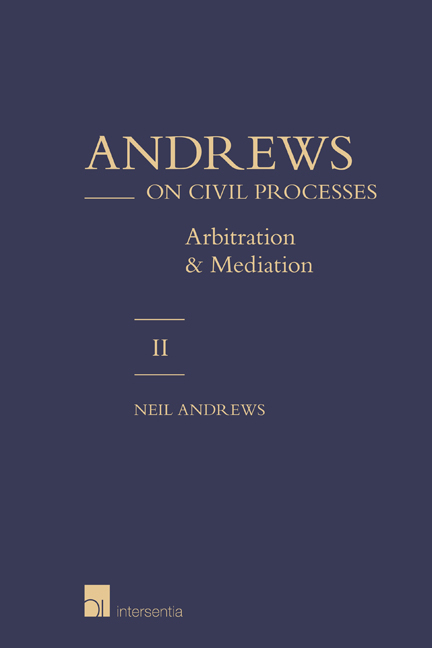Book contents
- Frontmatter
- Dedication
- CONTENTS VOLUME I
- Contents
- Table of Cases
- Table of Statutes
- Table of Statutory Instruments
- PART I MEDIATION
- PART II ARBITRATION
- Chapter 3 Commercial Arbitration: What Is It and Why Choose It?
- Chapter 4 The Major Principles of Arbitration and Litigation: A Comparison
- Chapter 5 Fundamental Features of English Arbitration
- Chapter 6 ‘The Seat’ and the Range of Relevant Laws
- Chapter 7 ‘Arbitrability’: Public Policy Limitations upon the Scope of Arbitration
- Chapter 8 A Confidential Process
- Chapter 9 Arbitration Agreements
- Chapter 10 Courts Giving Effect to Arbitration Agreements
- Chapter 11 Commencement of the Submission and Time Issues
- Chapter 12 The Tribunal's Appointment, Tenure and Immunity
- Chapter 13 Pre-Hearing Proceedings
- Chapter 14 The Hearing
- Chapter 15 Final Remedies, the Award, and Correction of the Award by the Tribunal
- Chapter 16 Fees, Expenses and Recoverable Costs
- Chapter 17 Arbitration Awards: Issues of Finality and Res Judicata
- Chapter 18 Challenges to English Arbitral Awards under English Law
- Chapter 19 English Enforcement of English Awards
- Chapter 20 Enforcement under the New York Convention (1958)
- PART III CONSUMER ADR
- Select Bibliography
- Index to Volumes I and II
Chapter 6 - ‘The Seat’ and the Range of Relevant Laws
from PART II - ARBITRATION
Published online by Cambridge University Press: 13 December 2017
- Frontmatter
- Dedication
- CONTENTS VOLUME I
- Contents
- Table of Cases
- Table of Statutes
- Table of Statutory Instruments
- PART I MEDIATION
- PART II ARBITRATION
- Chapter 3 Commercial Arbitration: What Is It and Why Choose It?
- Chapter 4 The Major Principles of Arbitration and Litigation: A Comparison
- Chapter 5 Fundamental Features of English Arbitration
- Chapter 6 ‘The Seat’ and the Range of Relevant Laws
- Chapter 7 ‘Arbitrability’: Public Policy Limitations upon the Scope of Arbitration
- Chapter 8 A Confidential Process
- Chapter 9 Arbitration Agreements
- Chapter 10 Courts Giving Effect to Arbitration Agreements
- Chapter 11 Commencement of the Submission and Time Issues
- Chapter 12 The Tribunal's Appointment, Tenure and Immunity
- Chapter 13 Pre-Hearing Proceedings
- Chapter 14 The Hearing
- Chapter 15 Final Remedies, the Award, and Correction of the Award by the Tribunal
- Chapter 16 Fees, Expenses and Recoverable Costs
- Chapter 17 Arbitration Awards: Issues of Finality and Res Judicata
- Chapter 18 Challenges to English Arbitral Awards under English Law
- Chapter 19 English Enforcement of English Awards
- Chapter 20 Enforcement under the New York Convention (1958)
- PART III CONSUMER ADR
- Select Bibliography
- Index to Volumes I and II
Summary
THE SEAT OF THE ARBITRATION
In England the ‘juridical seat of the arbitration’ is determined as follows:
(i) It can be ‘designated’ (a) ‘by the parties to the arbitration agreement’, or (b) ‘by any arbitral or other institution or person vested by the parties with powers in that regard’, or (c) ‘by the arbitral tribunal if so authorised by the parties’; or
(ii) in the absence of (i) (a) to (c), the seat can be ‘determined… having regard to the parties’ agreement and all the relevant circumstances’.
If the seat is England and Wales, the provisions of Part 1 of the Arbitration Act 1996 (England and Wales) apply.
Even if the seat is not England and Wales or ‘no seat has been designated or determined’ the Arbitration Act 1996 (England and Wales) will apply to the following matters: (i) the grant of a stay of legal proceedings; (ii) enforcement of an award; (iii) unless this is ‘inappropriate’, securing attendance of witnesses; (iv) unless this is ‘inappropriate’, various supportive powers concerning, for example, taking of evidence, preservation of evidence, etc; (v) the court can exercise any of the powers contained within Part 1 of the Arbitration Act 1996 (England and Wales) if ‘by reason of a connection with England and Wales… the court is satisfied that it is appropriate to do so’; (vi) the provision on the ‘separability’ of the arbitration agreement (9.07 ff); and (vii) the provision on the death of a party. Clarke J in ABB Lummus Global Ltd v. Keppel Fels Ltd (1999) considered the structure of these provisions of the Arbitration Act 1996 (England and Wales).
CHANGE OF SEAT
The English Arbitration Act 1996 does not appear to contain explicit guidance on whether the seat can be changed from that which was originally designated or determined. However, Clarke J in ABB Lummus Global Ltd v. Keppel Fels Ltd (1999) and Aikens J in Dubai Islamic Bank PJSC v. Paymentech Merchant Services Inc (2001) accepted that the parties can by agreement vary the seat.
- Type
- Chapter
- Information
- Andrews on Civil ProcessesArbitration and Mediation, pp. 155 - 168Publisher: IntersentiaPrint publication year: 2013



